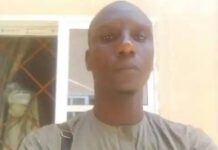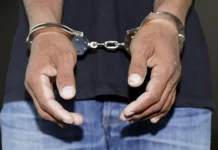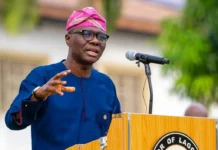 Arewa gives terms for dialogue with sect
Arewa gives terms for dialogue with sect
A COMBINATION of technology and rigorous surveillance enabled the nation’s security agencies to record a breakthrough in their efforts to check the activities of Boko Haram yesterday, according to the State Security Service, (SSS.).
The spokesman of the group, known as Abdul Qaqa, was reportedly arrested using the Global Positioning tracking System (GPS) in the early hours of yesterday by the State Security Services (SSS) in Maiduguri, Borno State.
Ahmed Abdullahi, the SSS state director confirmed the arrest to The Guardian on phone stating that “we have finally picked him up in the early hours of Wednesday, through the GPS; and he is currently in our custody for questioning at the State Security Service Headquarters on the Airport road.”
This claim has however been disputed by the SSS headquarters through spokesperson Marilyn Ogar who said last night that she had no idea where the information on Qaqa’s arrest came from. “We do not have him,” she said emphatically.
It was also learnt that Qaqa who had been speaking on behalf of the group, that identified themselves as Jamaatu Ahlil Sunna Lidawati wal Jihad, locally known as Boko Haram, is a Nigerian citizen from Kogi State, and a native of Igala in Central Nigeria.
Qaqa is said to have been responsible for the issuance of all threats meted out from the hidden enclave of the sect in Maiduguri metropolis, including the ones that preceded bombings of the Police Force headquarters building, the UN building, several other coordinated attacks and bombings in the northern states of Borno, Yobe, Gombe, Bauchi, Niger, Adamawa, and of recent Kano, the second most populous state in the country, where over 185 people were killed.
Sources from the secret police office in Maiduguri, said that the arrested suspected Boko Haram spokesman, could have been flown to Abuja, the Federal Capital for further interrogation by both the police and other security agents.
Recently, Qaqa sent a threat message to the Sultan of Sokoto, Speaker Aminu Tambuwal and Sokoto State acting governor, telling them to facilitate the release of Boko Haram members or face possible attack worse than the Kano attack.
Qaqa stated: “This is an open letter to the emir of Sokoto (Sultan of Sokoto) Alhaji Muhammad Sa’ad Abubakar 111, the Speaker of the House of Representatives, Alhaji Aminu Tambuwal and the Acting Governor of Sokoto State. Before we visited Kano, we wrote open letter to senior citizens there on the imperative of releasing our members but nobody cares to talk. Indeed, we sent three warnings to Kano before we strike. What happened in Kano will be inevitable in Sokoto unless you (Sultan and others) intervene and ensure the immediate and unconditional release of our members who were specifically arrested in the city of Sokoto on Thursday.”
Qaqa also faulted the call for dialogue by President Goodluck Jonathan, saying: “There is gross inconsistency in all the proclamations of the Nigerian leader. Our members are being trailed and killed on one hand, and on the other hand, some people are telling us to surrender our arms and come out. This is impossible.”
Earlier yesterday, the Federal Government was urged to make a commitment to the protection of the members of Boko Haram when they eventually come out for talks .
The appeal was made by the Arewa Consultative Forum (ACF) as it advised the government to continue, “to persevere, uncover the true identity of these people, to be able to determine their demands or grievances and address those that may be genuine and in accordance with our laws.”
Also, prominent lawyer, Chief Afe Babalola, has advised President Goodluck Jonathan to put in place processes for the convocation of a Sovereign National Conference (SNC) for the purpose of determining the future of the country in a manner acceptable to all the constituent parts.
The officials of ACF had earlier met with emirs, chiefs and religious leaders, under the headship of the Sultan of Sokoto, Alhaji Abubakar Sa’ad III, during a closed-door meeting on Tuesday, apparently to discuss the activities of Boko Haram and the dangers they pose to the country.
At a press conference in Kaduna yesterday, the National chairman of ACF, Alhaji Aliko Muhammed, said that considering the increased level of insecurity in the country as a result of the activities of Boko Haram, the President should ensure that there was genuine dialogue between the government and the leaders of the sect.
The ACF boss particularly lamented the bombings in Kano and other parts of the North, which led to the death of several hundreds of Nigerians.
Muhammed explained that the leadership of the Northern Elders had earlier held an emergency meeting last week, stating that “having reviewed the horrendous attacks on Kano and the spate of attacks on many parts of the North which, at the last count, have claimed the lives of over 2000 people, Muslims, Christians, northerners, southerners – everyone – and an unquantifiable value of property across the North, the meeting came to the conclusion that unless addressed quickly and decisively, the threat posed by these attacks have reached such a level that threaten national peace and order and have the potential to cause the collapse of peace, security and public order in the North in particular and the nation in general.”
He said that the Arewa leaders had resolved that, “the Federal Government should commit itself openly and unambiguously in guaranteeing the security of leaders of Boko Haram when eventually they come out for dialogue promised by Mr. President.”
ACF then called “upon all people of good conscience who may have access to members of Boko Haram to urge them to take advantage of secure channels of communication to be provided by the Federal Government towards achieving a resolution of the current bloody impasse.”
The group also enjoined “the leaders and members of Boko Haram to realise that no religious doctrine permits the killing of innocent lives,” stressing that “it is important to point out to them that they are inflicting terror, death and destruction upon people not in any way responsible for whatever injustice they believe have been done to them.”
The group urged both the Federal and state governments to demonstrate fairness and justice in dealing with all issues of insecurity and infringement of the laws across the nation. The ACF noted “with grave concerns some serious allegations peddled by certain people to the effect that some people from other sections of the country were conspiring to cause high level of insecurity across the country with the clear intention of making the country ungovernable.”
The Northern socio-cultural group commended the recent changes made in the Police for better services, but it stated that “in view of the widespread ineffectiveness with which current security challenges are being tackled,” the government should extend similar re-organisation to all other security agencies, especially the intelligence community.
In an interview with The Guardian, Babalola said because of the increasing level of insecurity in the country, the defective 1999 Constitution as well as the killings in the country, it was certain that what the country needed now was SNC.




